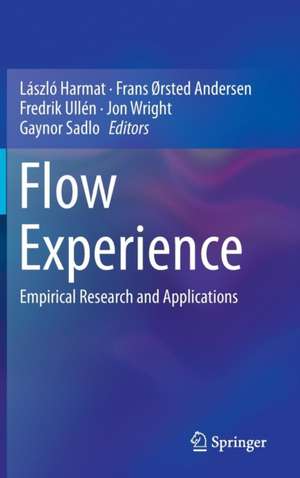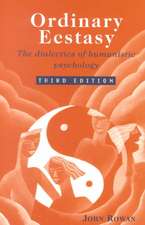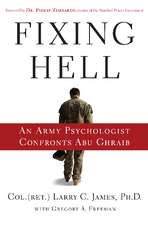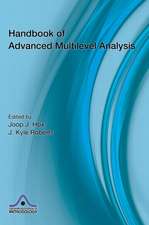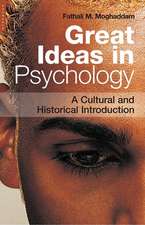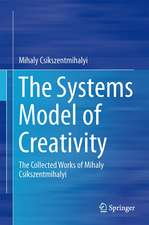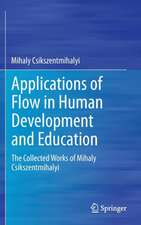Flow Experience: Empirical Research and Applications
Editat de László Harmat, Frans Ørsted Andersen, Fredrik Ullén, Jon Wright, Gaynor Sadloen Limba Engleză Hardback – 10 mai 2016
| Toate formatele și edițiile | Preț | Express |
|---|---|---|
| Paperback (1) | 1004.48 lei 6-8 săpt. | |
| Springer International Publishing – 13 iun 2018 | 1004.48 lei 6-8 săpt. | |
| Hardback (1) | 391.11 lei 3-5 săpt. | +38.34 lei 4-10 zile |
| Springer International Publishing – 10 mai 2016 | 391.11 lei 3-5 săpt. | +38.34 lei 4-10 zile |
Preț: 391.11 lei
Nou
Puncte Express: 587
Preț estimativ în valută:
74.86€ • 81.34$ • 62.93£
74.86€ • 81.34$ • 62.93£
Carte disponibilă
Livrare economică 01-15 aprilie
Livrare express 15-21 martie pentru 48.33 lei
Preluare comenzi: 021 569.72.76
Specificații
ISBN-13: 9783319286327
ISBN-10: 3319286323
Pagini: 430
Ilustrații: XVII, 392 p. 43 illus.
Dimensiuni: 155 x 235 x 29 mm
Greutate: 0.75 kg
Ediția:1st ed. 2016
Editura: Springer International Publishing
Colecția Springer
Locul publicării:Cham, Switzerland
ISBN-10: 3319286323
Pagini: 430
Ilustrații: XVII, 392 p. 43 illus.
Dimensiuni: 155 x 235 x 29 mm
Greutate: 0.75 kg
Ediția:1st ed. 2016
Editura: Springer International Publishing
Colecția Springer
Locul publicării:Cham, Switzerland
Public țintă
ResearchCuprins
Preface.- PART I. Flow Experience: General Introduction.- Chapter 1. Flow and Psychological Selection; Antonella Delle Fave and Marta Bassi.- Part II. Flow in Arts and Sports.- Chapter 2. Finding Flow in Music Practice: An Exploratory Study about Self-Regulated Practice Behaviours and Dispositions to Flow in Highly Skilled Musicians; Ajauró M.V. and Heim C.F.- Chapter 3. The Experience of Flow in Artistic Creation; Tatiana Chemi.- Chapter 4. Flow in Sport; Christian Swann.- Chapter 5. Running and Flow. Does Controlled Running lead to Flow-States?: Testing the Transient Hypofrontality Theory; Oliver Stoll and Jan M. Pithan.- Part III. Flow, Creativity and Productivity.- Chapter 6. Flow in Creativity: A Review of Potential Theoretical Conflict; Genevieve M. Cseh.- Chapter 7. Intuition and Flow; Lauri Järvilehto.- Chapter 8. Flow at Work as a Moderator of the Self-Determination Model of Engagement; Daniela De Fraga and Giovanni B. Moneta.- Part IV. Flow in Education.- Chapter 9. The EduFlow Model: A Contribution Toward the Study of Optimal Learning Environments; Jeanne Heutte, Fabien Fenouillet, Jonathan Kaplan, Charles Martin-Krumm and Rémi Bachelet.- Chapter 10. Using ESM to Study Flow in a STEM Project; Frans Ørsted Andersen.- Chapter 11. Flow, Leisure, and Positive Youth Development; Teresa Freire, Dionísia Tavares, Eliana Silva and Ana Teixeira.- Part V. Flow in Every Day Experiences.- Chapter 12. Flow in the Context of Daily Experience Fluctuation; Marta Bassi and Antonella Delle Fave.- Chapter 13. Flow Within Everyday Emotions and Motivations: A Reversal Theory Perspective; Jon Wright.- Part VI. The Social Flow.- Chapter 14. Social Psychology of Flow: A Situated Framework for Optimal Experience; Marco Boffi, Eleonora Riva, Nicola Rainisio and Paolo Inghilleri.- Chapter 15. The Application of Team Flow Theory; Jef J.J. van den Hout, Orin C. Davis and Bob Walrave.- Chapter 16. New Technologies as Opportunities for Flow Experience: A Framework for the Analysis; Stefano Triberti, Alice Chiroco and Giuseppe Riva.- Part VII. Flow and Personality.- Chapter 17. Flow and Individual Differences: A Phenotypic Analysis of Data from More than 10,000 Twin Individuals; Fredrik Ullén, László Harmat, Töres Theorell and Guy Madison.- Chapter 18. Optimal Experience and Optimal Identity: A Multinational Examination at the Personal Identity Level; Yanhui Mao, Scott Roberts and Marino Bonaito.- Chapter 19. The Flow Experience in Clinical Settings: Applications in Psychotherapy and Mental Health Rehabilitation; Eleonora Riva, Teresa Freire and Marta Bassi.- Part VIII. Psychological Correlates of the Flow Experience.- Chapter 20. Experimental Paradigms to Investigate Flow-Experience and Its Psychophysiology - Inspired from Stress Theory and Research; Tahmine Tozman and Corinna Peifer.- Chapter 21. The Flow Experience Revisited: The Influence of Skills-Demands-Compatibility on Experiential and Psysiological Indicators; Johannes Keller.- Chapter 22. Towards a Neorobiological Understanding of Reduced Self-Awareness during Flow: An Occupational Science Perspective; Gaynor Sadlo.
Notă biografică
László Harmat has been postdoctoral research fellow at the Karolinska Institute, Department of Neuroscience in Fredrik Ulléns’ group since 2011. He completed his Ph.D. in 2010 at Semmelweis University, Institute of Behavioral Sciences, Budapest, Hungary and he was a lecturer in psychology at the same institution for several years. His main research interest involves exploring the neurophysiological underpinnings of psychological flow experience; the psychophysiological and therapeutic effects of music. He also investigates the neurophysiological underpinnings of expertise and skill learning. László Harmat is a graduated music teacher and he has been leading a chamber choir in Stockholm, Sweden since 2012.
Frans Ørsted Andersen has been an Associate Professor at the Department of Education, Aarhus University, Denmark, since 2010. He is involved in school research at many levels and has conducted research within areas like motivation, engagement, cooperation, attention, learning and attention at both primary and secondary school levels, using flow as a concept and a theory to understand optimal learning environments. Teaching and learning in the STEM area (Science Technology Engineering and Math) is another area researched by Frans Ørsted Andersen. He also works with comparative Nordic educational research and has looked especially at the qualities of Finnish education. He has published several books and articles on flow, mainly in Danish and Norwegian, the latest book title being “Flow i hverdagen. Navigation mellem kaos, stress og kedsomhed” [Flow in everyday life. Navigation between chaos, stress and boredom](2013).
Fredrik Ullén is Professor of Cognitive Neuroscience at the Department of Neuroscience, Karolinska Institutet, since 2010. An overall aim of his research is to analyse the neuropsychology of expert performance, i.e. the various brain mechanisms that allow us to perform at a very high level within a specific domain, after many years of training. One specific research interest is the psychological flow state, its underlying mechanisms, and its importance for motivation and creativity in expertise. The research of Ullén is mainly focused on musicians as a model group. Methodologically his team combines neuroimaging and behavior genetic analyses with experimental psychology and physiology. In addition to his career as a scientist, Professor Ullén is active as a professional pianist, and is represented as a soloist on around 20 CD records. He is a lifetime fellow of the Swedish Royal Academy of Music since 2007.
Jon Wright is a Principal Lecturer in the School of Health Sciences at the University of Brighton. He completed his PhD in 2008 exploring the process of optimal experiences utilising a phenomenological approach. Within his research Jon provides an occupational science perspective, a science that underpins his professional background as an occupational therapist. His research has integrated Reversal Theory to help our conceptualisation of flow. Jon’s research continues to explore the flow concept and with a team of Network Partners he is aiming to establish a shared conceptualisation of flow, developing guidelines regarding the utility of different measurements and indicators of flow.
Textul de pe ultima copertă
This volume provides updates and informs the reader about the development of the current empirical research on the flow experience. It opens up some new research questions at the frontiers of the field. The book offers an overview on the latest findings in flow research in several fields such as social psychology, neuropsychology, performing arts and sport, education, work and everyday experiences. It integrates the latest knowledge on experimental studies of optimal experience with the theoretical foundation of psychological flow that was laid down in the last decades.
Caracteristici
Offers an overview on the newly discovered findings in flow research Updates the development of the current empirical research on the psychological flow experience Presents and discusses new empirical findings in flow research with an overview of the current research from European Flow Researchers Network (ERFN)
